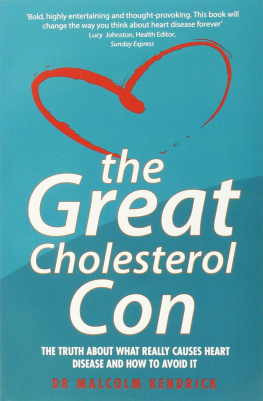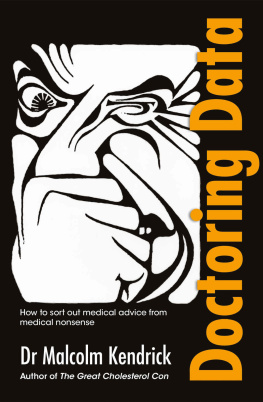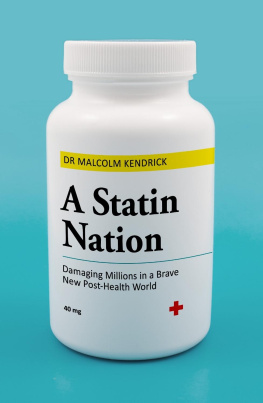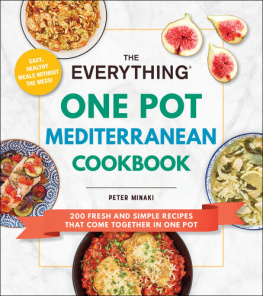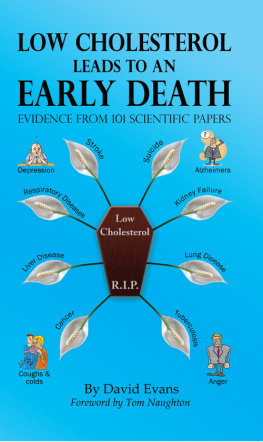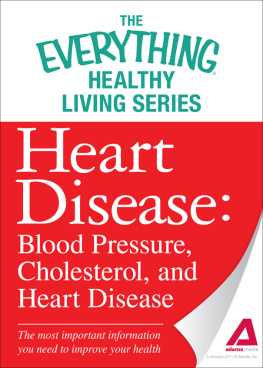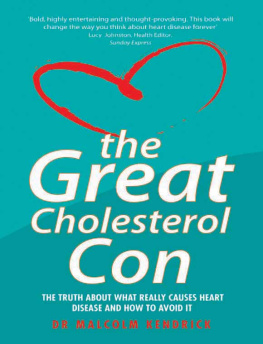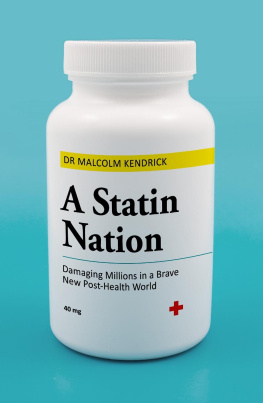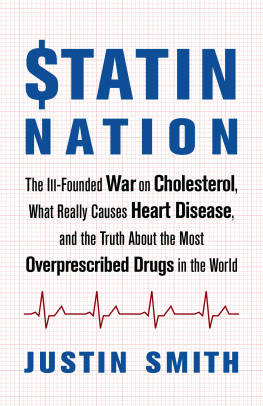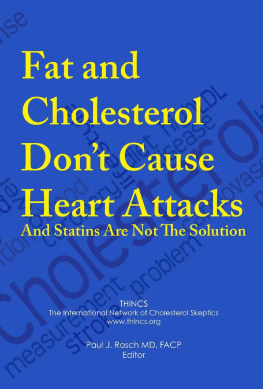
CONTENTS
All humans must die astatinate, astatinate!
A Dalek
W e are bombarded with so much confusing nonsense about heart disease that it is difficult to know where to start. Each day that dawns, it seems, heralds a new study that flatly contradicts the last. Omega 3 fish oils are good for you; Omega 3 fish oils are not good for you. Alcohol protects against heart disease; alcohol does not protect against heart disease. Coffee is good for you; coffee is bad for you. Or maybe it was excess milk in the diet, or green-leaf tea, or To quote my lovely daughter, yeah, whatever.
It has reached the point where I feel like shouting, Listen guys, I know you need to publish or perish, and the more publicity you can achieve the bigger the next research budget, but youre scaring people half to death. No one knows what to do or what to believe any more. And by the way, your study was RUBBISH! Now go away, grow your beard, and do some proper boring research that no one can understand.
But they wont. For its so much more fun to appear on a news programme, talking earnestly about your discovery of the latest possible cause of heart attacks a danger that the public absolutely, positively, must be warned about. Afterwards, you will probably be invited to lucrative speaking engagements at international cardiology conferences. Does a professorship beckon? Who, me? I really dont deserve it, but if you must
Somehow, in this ever-changing, ever-confusing world, one idea has stood the test of time. And it is this:
The Diet-Heart Hypothesis
(aka The Cholesterol Hypothesis)
If you eat too much food containing cholesterol and/or saturated fat, the level of cholesterol in your blood will rise. The excess cholesterol will be deposited in artery walls, causing them to thicken and narrow. In time this will block blood supply to the heart (and other organs) causing a heart attack, or stroke.
Whichever name you use for it, this hypothesis has the advantage of being extra-super straightforward suitable for children from the age of five upwards, no parental guidance required. But be careful. Perhaps the single greatest prejudice in scientific research the researchers holy grail, if you like is the belief that, in the end, the simplest solutions are correct. Occams razor, E=MC, the perfect four base sequence of DNA. But it is as well to remember a warning from history:
For every complicated problem there is a solution that is simple, direct, understandable and wrong.
HL Mencken
And boy, is the cholesterol hypothesis wrong. To adapt a quote from Blackadder, It is wronger than a very wrong thing. Yet it has mesmerised scientists, doctors and the general public for years, exuding a siren song that none can resist, dragging us all to our doom on the sharp rocks of illogicality.
OK, when you look at the eye-watering profits being generated, it hasnt exactly dragged pharmaceutical companies to their doom yet. Indeed, once everyone believed that a high cholesterol level was the most important single cause of heart disease, the gold rush was on to discover drugs that could lower cholesterol levels. A highly successful gold rush led by big pharmaceutical companies.
Admittedly, at first things didnt go too well. Various substances were discovered in the 1960s and 1970s that, to widespread rejoicing, lowered cholesterol levels. However, when the clinical trials were carried out it was found that more people died when they took the drugs than when they took the placebo. In some cases the cholesterol-lowering agents very nearly doubled the overall mortality rate. Which did put rather a dampener on proceedings.
In 1970, a study by the WHO (the World Health Organization, not the rock group) on clofibrate (a big drug at the time, but now defunct for reasons that will shortly become apparent), measured blood cholesterol in 30,000 healthy, middle-aged men in Edinburgh, Prague and Budapest. The 10,000 men with the highest blood cholesterol levels were selected for the trial half to receive clofibrate, half placebo. After five years there had been a total of 128 deaths in the clofibrate group and 87 in the placebo group. Oops. And there were more fatal heart attacks in the clofibrate group too.
It was decreed, however, that this problem had nothing whatsoever to do with the cholesterol-lowering ability of clofibrate. Perish the very thought. The drug obviously had some other, nasty, heart-diseasecausing effects not that anyone was quite sure what these effects were. But because everyone already knew that a high cholesterol level caused heart disease, no one dared suggest that these results might just might contradict the cholesterol hypothesis. Hey ho, let not the facts spoil a good story.
The 1960s, 1970s and 1980s represented a period that could be known as the bs era; the time Before Statins began. (In a nutshell, statins are drugs that lower cholesterol and so, in the eyes of the mainstream medical community, are believed to reduce the risk of heart disease. More on this subject much more to follow.)
In this period new drugs were found; they lowered cholesterol, but increased mortality and were, frankly, worse than useless. I think it is true to say that the faith of the cholesterol brotherhood was becoming sorely tested. Even the pharmaceutical industry was, with extreme reluctance, heading off in different directions. Just to give one example: I find it amusing to keep a copy of a document produced by pharmaceutical giants Pfizer in 1992. This was a couple of years before statinomania achieved lift-off. The document was called Pathologic Triggers: New Insights Into Cardiovascular Risk. I may have the only remaining copy of this document. As such it must be worth ooh, 50p at least.
The document begins:
Today, most of our attempts to prevent atherosclerosis [disease of the arteries] have centered on the control of hypertension and hyperlipidaemia [raised blood pressure and raised cholesterol, respectively], as well as lifestyle factors. However, recent insights into the pathology of coronary disease have sharpened our focus on the natural history of atheroma [build-up of fatty deposits on the lining of arteries] and its relentless progression to acute cardiac events
Curiouser and curiouser. What could they mean? In fact, throughout this document Pfizer is carefully preparing the ground for an entirely new concept: that it is not really high blood pressure and high cholesterol levels that cause heart disease it is something else. But what could this something else be?
What indeed. According to New Insights into Cardiovascular Risk, heart disease is mainly associated with the formation of abnormal blood clots
Given the insidious nature of atherosclerosis, it is vital to consider the role of platelets [small blood cells involved in blood clotting] and thrombosis [the formation of blood clots within a blood vessel or the heart] in the process
Today, together with the rest of the industry, they would dismiss such talk of platelets and thrombosis as utter bunk for today we have statins. If anyone mentioned platlets now they would be told to pick up their pay cheque on the way past reception.
And how were statins discovered these glorious and magical pills that will turn us all into latter-day Methuselahs, living well into our sixth centuries? Were they discovered by highly trained scientists toiling in research laboratories, deep in the bowels of a major pharmaceutical company? Were they discovered using three-dimensional modelling and a detailed understanding of the inner workings of liver biochemistry? Do they, indeed, represent another glorious vindication of the value of the industrys much-vaunted multi-billion-dollar research and development budget? Ah no. As with many of the best-selling drugs, statins were discovered completely by accident.
Next page
